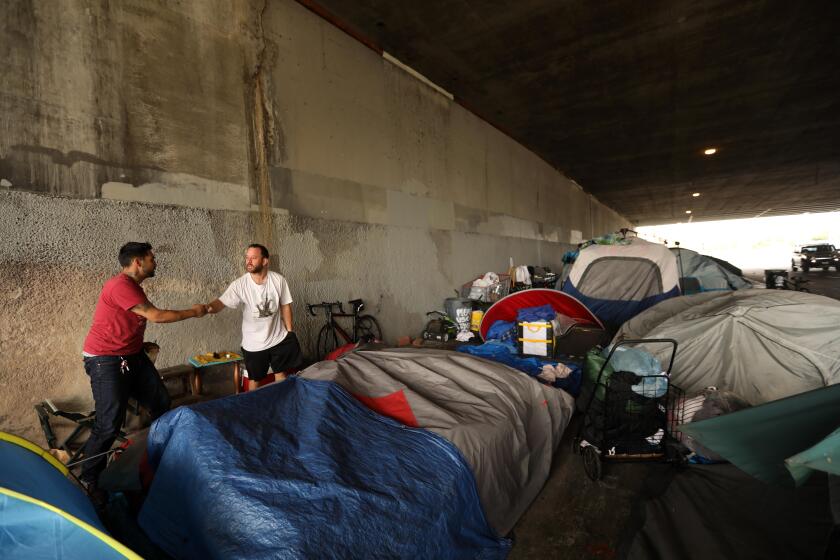He ran as a City Hall reformer. His rivals say he’s fallen short on homelessness
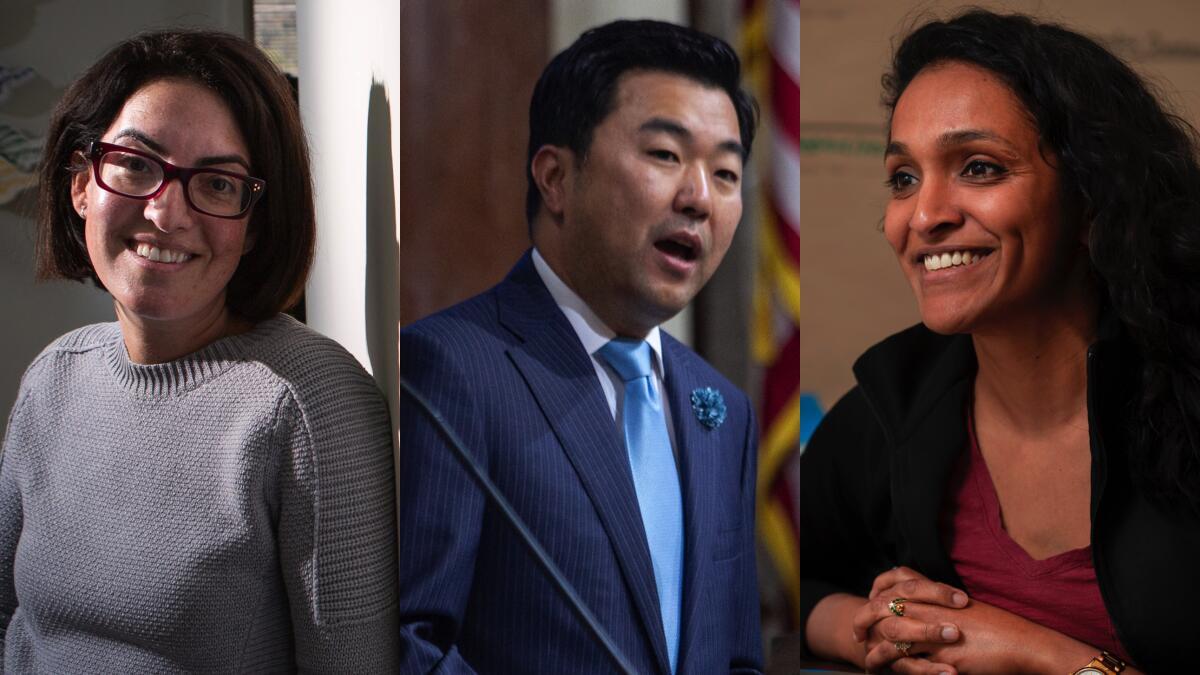
- Share via
When David Ryu declared victory in his first bid for the Los Angeles City Council five years ago, he proclaimed, “We are finally telling City Hall that we do not like ‘business as usual.’”
Ryu had campaigned as a City Hall outsider and harnessed neighborhood anger over real estate development, vowing not to take developer donations for his campaign. Now Ryu is trying to defend his seat from new challengers amid the homelessness crisis, which has overtaken other municipal issues to become the overwhelming focus of the March race.
When he tried to talk about homelessness during his first campaign, “no one really wanted to hear about it,” Ryu said at a recent luncheon. Now, “you cannot go anywhere without talking about homelessness.”
His sprawling district, which stretches from the Miracle Mile through the Hollywood Hills to Sherman Oaks, had the biggest spike in its homeless population last year — 53% — of any council district in the city, according to the last count. Two of his rivals, Sarah Kate Levy and Nithya Raman, say Ryu has failed to take urgent action to help people on the streets.
“If you think it’s a FEMA-level crisis, behave like it’s a FEMA-level crisis,” Levy said, invoking a phrase used by the councilman. She argued that safe sites for people to sleep in their vehicles or tents could be set up immediately.
A third challenger, who is waging a write-in campaign, Sherman Oaks real estate agent Susan Collins, argues that Ryu is addressing homelessness only as a housing issue “as opposed to the mental health and addiction crisis it is.”
In reaction to his critics, Ryu has pointed to new and soon-to-be-opened housing and shelters for homeless people in his district, saying that his district is “leading the charge.”
The councilman is also pushing to change the City Charter to give a single executive — possibly the mayor or a homelessness czar — emergency powers to decide where to put homeless housing. He wants to make it easier to provide involuntary care to people who would face “immediate harm or death” without it. And he has argued that other efforts, such as establishing savings accounts for L.A. schoolchildren, will help battle the broader problem of poverty.
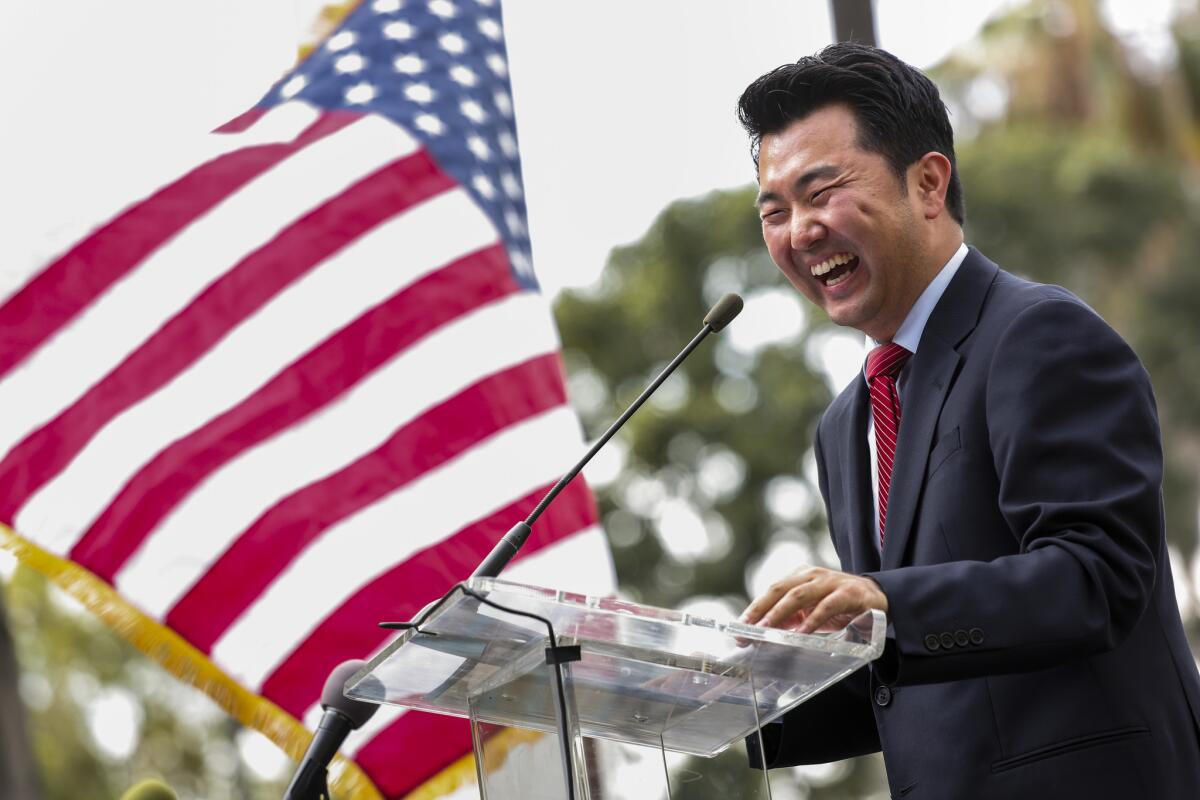
Beyond homelessness, Ryu has touted his efforts to clamp down on developer donations, expand park access and make discretionary spending in his office more transparent.
Anthony Holland, who once ran a campaign for a candidate running against Ryu, said the councilman had shown “real courage” in pushing to bar donations from developers seeking to build L.A. projects. He also pointed to Ryu urging the Southern California Assn. of Governments to set higher goals for housing across the region.
“He’s taken the things that he ran on — and he stuck to them,” said Holland, a Mercury Public Affairs director who helped raise funds for Ryu this time around.
Ryu has raised more than four times as much in campaign contributions as any of his opponents — more than $900,000 — and snapped up endorsements from the county Democratic Party, unions and neighborhood leaders.
Help us inform our reporting about the homelessness crisis in California by submitting your questions.
But his seat could nonetheless be in play in the face of frustration with rising homelessness — as well as a flood of new voters coming to cast ballots in the presidential primary. This is the first year that City Council elections are being held at the same time as national races, a shift expected to boost turnout among left-leaning voters.
Ryu has made some decisions that upset progressives: He voted with the council to reinstate restrictions on where people can live in their cars, which activists denounced as a “de facto ban.” Ryu spokesman Mark Pampanin said at the time that Ryu was willing to allow the law to be enforced “when necessary — which is very rare,” but would not want to reinstate it again now.
In August, he sat on a council committee that agreed to forward a new set of proposed restrictions on where people could sleep on sidewalks. At the time, Ryu said he hadn’t had a chance to review the proposal on sidewalk sleeping, but remarked that “it sounds good.” When that same plan went before the council, Ryu criticized the idea, declaring that “we don’t have the luxury of dictating where tents can be when they’re growing by the thousands.”
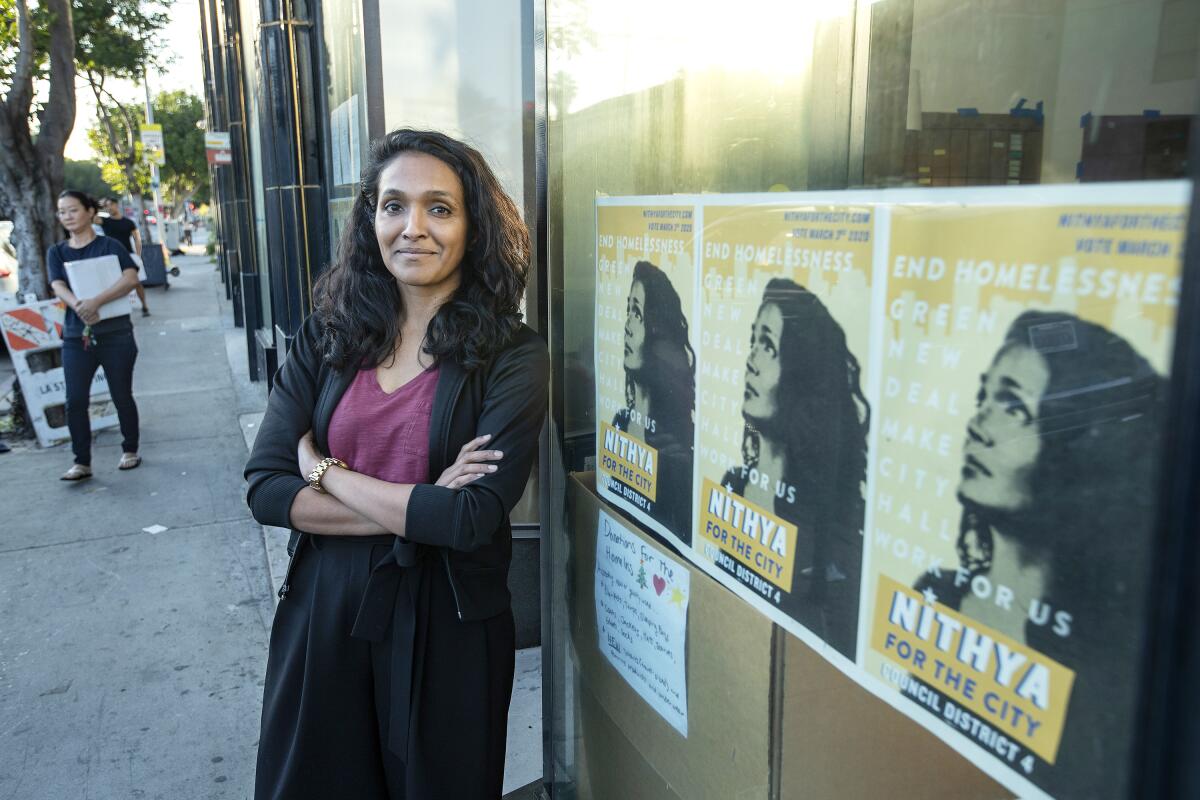
Sherin Varghese, a co-founder of the homeless outreach and advocacy group KTown for All, said she was dismayed that Ryu had forwarded the proposal from the committee without appearing to understand it. (Ryu deputy campaign manager Daniel Eyal later said that Ryu forwarded the plan so that it would be discussed by the full council with community involvement.)
“This is your job — and you’ve got volunteer activists who understand the law better than you do,” said Varghese, who supports Raman in the race. “We’ve seen a slight change in rhetoric, but no action to back that up.”
Raman “brings a depth of understanding that has gotten ignored for a long time,” Varghese said.
Raman helped start a neighborhood coalition to do homeless outreach in her Silver Lake neighborhood. When she worked for the city administrative officer, she wrote a report that found an “incredible gulf between the rhetoric and the reality of how the city was responding to the issue,” with the bulk of city money spent on homelessness going to policing.
“What we’ve created in L.A. is not a system that is designed to help people,” said Raman, who more recently headed the women’s rights group Time’s Up Entertainment. As a candidate, she is calling for a network of “community access centers” where homeless people can consult with case managers and get food, medical care and other assistance.
Raman added that the city should be doing more to prevent people from sliding into homelessness. She has called for rent freezes on rent-stabilized units, more financial assistance for renters at risk of eviction, and a right to legal counsel for tenants regardless of income or citizenship status.
“Our City Council has an incredible amount of power,” Raman said. “And so far they have failed to use it to push us toward a Los Angeles that protects residents.”
Levy, too, has called for more urgent action to help homeless people, including “safe parking” sites where people can park and sleep and “safe campsites” with counseling and other services. She called the push to hand the mayor more power over where homeless housing is built “cowardly,” saying it amounts to saying “someone else should solve this problem.”
And Levy argues that Ryu and the rest of the council should ease the way for new housing and make it more affordable to build by speeding up the permitting process. She criticized him for opposing SB 50, a law that would allow for denser housing near rail lines and job centers, instead of trying to adjust it. Levy backs the latest version of the bill.
Park La Brea resident Bob Shore said he was backing Levy because he wanted Los Angeles to be affordable enough for his 20-year-old son. Ryu is “much more willing to cater to NIMBY sentiment than Sarah Kate would be,” Shore said.
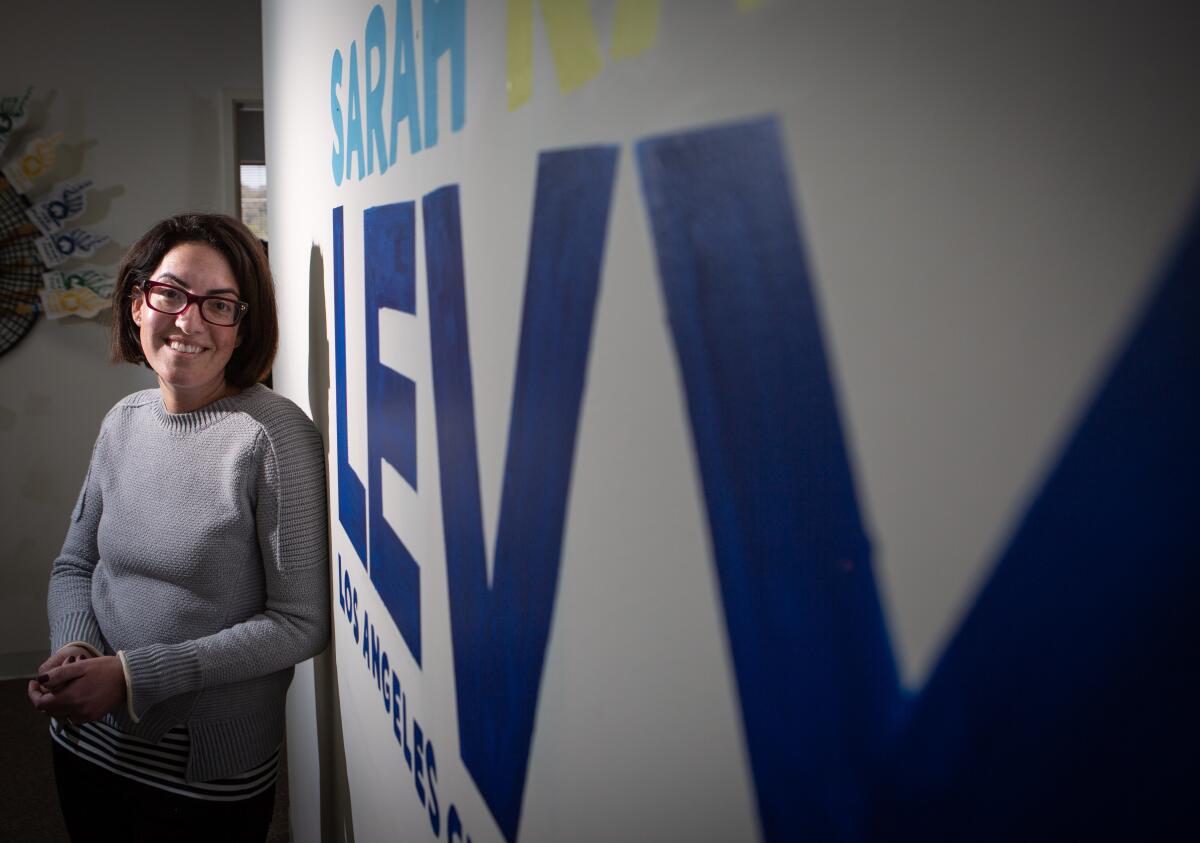
Ryu said he was worried that SB 50 lacked protections for tenants and would not produce enough affordable housing. At a recent forum, Raman also said she had heard serious concerns about how the bill could affect displacement and real estate speculation, which she said any revised version must address.
Rivals of the councilman also charge that the new rules on developer donations don’t go far enough. And both Levy and Raman have criticized Ryu for taking donations tied to the real estate industry, some of which he later returned. Levy has also criticized Ryu over “behested payments” — donations solicited by politicians for their favorite charities.
“If you’re still taking the developer dollars that you say you’ve been fighting against, and if you’re still taking the behested payments that you say you’re fighting against, then what exactly have you reformed?” Levy asked.
Ryu said that his campaign was keeping its pledge, but that some developer donations had initially escaped its notice. The councilman said that behested payments he solicited went to support Asian Pacific American Heritage Month celebrations and that he was offended by the idea that “we should not support arts and Asian American and Pacific Islanders.”
And he agreed that more reform is needed on campaign finance, but stressed that the latest step took years at City Hall. “It’s easy on the activist side to point fingers,” Ryu said, but council members are responsible for “getting the job done.”
If no candidate wins more than 50% of the vote in March, the top two finishers will go to a runoff in November.
More to Read
Sign up for Essential California
The most important California stories and recommendations in your inbox every morning.
You may occasionally receive promotional content from the Los Angeles Times.
